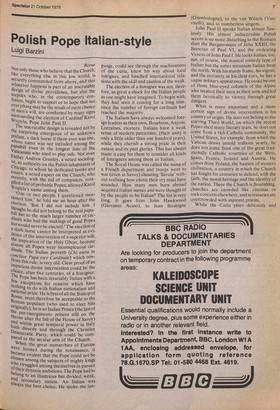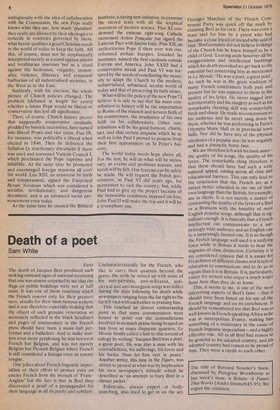Polish Pope Italian-style
Luigi Barzini
Rome Not only those who believe that the Church: like everything else in this low world, is securely commanded from above, and that Whatever happens is part of an inscrutable design of divine providence, but also the sceptics who, in the contemporary confusion, begin to suspect or to hope that not everything may be the result of mere chance or men's will, are comforted by many signs surrounding the election of Cardinal Karol Wojtyla, Pope John Paul II. The inscrutable design is revealed not by the surprising emergence of an unknown prelate, a dark horse if there ever was one, Whose name was not included among the Papabili even in the longest lists of the Vahcanists who tried to play safe. Not even Father Andrew Greeley, a noted sociologIst,an authority on the Polish inhabitants of Chicago, to whom he dedicated books and essays, a noted expert on the Church, who recently, with the aid of computers, compiled a list of probable Popes, allowed Karol Wo, jtyla's name among them. One or two people I questioned menhoned him,' he told me an hour after the election. 'But I did not include him. I thought he did not belong to the real papabill but to the much larger number of cardinals who had the makings of good Popes but would never be elected.' The election of a dark horse cannot be interpreted as evidence of the intervention of a superior the inspiration of the Holy Ghost, because almost all Popes were inconspicuous cardinals. The Italian proverb (Chi entra in conelave Papa esce Cardinale) which confirms this rule, is very old. Clear proof of an impatient divine intervention could be the Choice, after five centuries, of a foreigner. The Pope has been invariably Italian with a few exceptions for reasons which have n°thing to do with Italian nationalism and national pride. He is first of all the Bishop of Rome, must therefore be acceptable to the Roman populace (who used to elect him he is an Italian Prince (the last of the pre-risorgimento princes still on the throne after the fall of the House of Savoy) and wields great temporal power in Italy both directly and through the Christian Democratic Party, which could be compared to the secular arm of the Church. When the great monarchies of Europe Were formed during the renaissance, it became evident that the Pope could not be chosen among the subjects of mighty kings who struggled among themselves in pursuit of their dynastic ambitions. The Pope had to belong to an illustrious but divided, weak, and secondary nation. An Italian was always the best choice. He spoke the lan guage, could see through the machinations of the curia, knew his way about local intrigues, and handled international relations with the skill and caution of the weak.
The election of a foreigner was not, therefore, as great a shock for the Italian people as one might have imagined. To begin with, they had seen it coming for a long time, since the number of foreign cardinals had reached the majority. The Italians have always welcomed foreign leaders as their own, Bourbons, Anjous, Lorraines, etcetera. Italians have a weak sense of modern patriotism, (their unity is only a little older than one hundred years), while they cherish a strong pride in their nation and its past glories. This has always made it easy for them to consider all kinds of foreigners among them as Italian. The Royal House was called the name of a French department and troops went to war (even in Savoy) shouting `Savoia' without realising how exotic their cry must have sounded. How many men born abroad acquired Italian names and were thought of by the people to be Italian? The list is very long. It goes from John Hawkwood (Giovanni Acuto), to Jean Boulogne (Giambologna), to the van Wittels (Vanvitelli), and to numberless singers.
John Paul II speaks Italian almost flawlessly. His almost indiscernible Polish accent is no more disturbing to the Romans than the Bergamasque of John XXIII, the Brescian of Paul VI, and the endearing Veneto of John Paul!. He looks Italian, too, not, of course, the musical comedy type of Italian but the sober mountain Italian from the north. With his sturdy frame, his vigour, and the certainty in his clear eyes, he has a vague military appearance. He could be one of those blue-eyed colonels of the Alpini who treated their men as their sons and led them heroically to victory through great dangers.
What is more important and a more certain sign of divine intervention is his country of origin. He does not belong to the starving Third World, on which the recent Popes shed many literary tears, he does not come from a rich Catholic community, the United States, for example, from which the Vatican draws untold millions yearly, he does not come from one of the great traditionally Catholic countries of the West, Spain, France, Ireland and Austria. He comes from Poland, the bastion of western civilisation, a country in which the Church has fought for centuries to defend, with the faith, the moral heritage and the identity of the nation. There the Church is flourishing, churches are crowded like cinemas or rock concerts elsewhere, and seminaries are overcrowded with aspirant priests.
While the Curia plays delicately and ambiguously with the idea of collaboration with the Communists, the new Pope really knows what they are; how much 'pluralism' they really are allowed by their ideologies to concede in countries governed by them, what heroic qualities a good Christian needs in the world of today to keep the faith. All this, of course, must not be simplistically interpreted merely as a stand against atheist and totalitarian marxism but as a stand against the hedonism, vulgarity, immorality, violence, illiteracy, and renascent barbarism of all industrialised societies, in the West as in the East.
Suddenly, with his election, the whole picture of Church policies changed. The problem (debated at length for years) whether a future Pope would be liberal or conservative has lost all significance.
Then, of course, Church history proves that supposedly conservative cardinals, prodded by historic necessities, have turned into liberal Popes and vice versa. Pius IX, for instance, was politically a liberal when elected in 1846. Then he delivered the Syllabus (a reactionary document if there was one) and convened Vatican Council I, which proclaimed the Pope supreme and infallible. At the same time he promoted and encouraged foreign missions all over the world. Leo XIII, an aristocrat by birth and temperament, signed the Encyclical Rerum Novarurn which was considered a socialist, revolutionary, and dangerous document, and is an advanced social pronoucement even today. At the same time he created the Biblical Institute, a daring new initiative, to examine the sacred texts with all the sceptical resources of modern science. Pius XI condemned the extreme right-wing Catholic movement Action Frangaise but signed the Lateran Pact with fascist Italy. Pius XII, an authoritarian Pope if there ever was one, reformed archaic liturgies, founded lay institutes, named the first cardinals outside Europe and America. John XXIII had a conservative streak and Paul VI was tortured by the needs of conciliating the necessity to adapt the Church to the modern, industrialised, urbanised, secular world of today and that of preserving its faith intact.
What will be the policy of the new Pope? I believe it is safe to say that his main contribution to history will be the importation to Rome of the staunch and fervent faith of his countrymen, the irradiation of his own faith on his collaborators. Other contributions will be his good humour, charm, tact, and that certain simpatia which he as well as John Paul I proved to possess from their first appearances on St Peter's balcony.
The world today needs hope above all. ' For the rest, he will do what will be necessary, as events and problems mature, and needs will be felt. One forecast can be safely be made. He will request the Polish government, as Paul VI did years ago, for permission to visit the country, but, while Paul had to give up the project because of the impossible conditions imposed on him, John Paul II will make the trip and it will be a triumphant one.







































 Previous page
Previous page